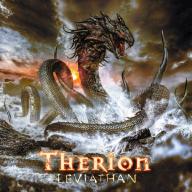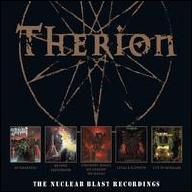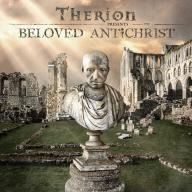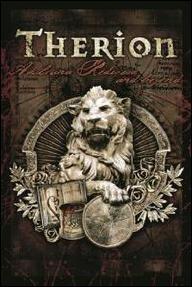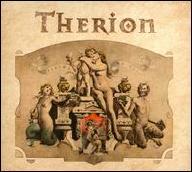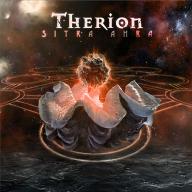Johnsson founded Therion as a first wave Swedish death metal outfit in 1987 and took its name from Celtic Frost's To Mega Therion. The word is Greek in origin and translates to "beast." It has occult connotations (Aleister Crowley was fond of using it to describe himself). The initial lineup was rounded out by lead guitarist Peter Hansson, bassist Erik Gustafson, and drummer Oskar Forss, and the group debuted in 1990 with the LP Of Darkness. Gustafson exited soon after, and as a three-piece Therion returned in 1991 with Beyond Sanctorum. By 1993's Symphony Masses: Ho Drakon Ho Megas, only Johnsson remained from the original lineup, now backed by guitarist Magnus Barthelson, bassist Andreas Wallan Wahl, and drummer Piotr Wawrzeniuk. The album marked the beginnings of a more experimental approach, with Johnsson incorporating more orchestration and pseudo-classical aspirations, plus some industrial textures.
Both Barthelson and Wahl were gone by 1995's The Beauty in Black EP; the addition of bassist Fredrik Isaksson returned Therion to a trio. The same roster appeared on the full-length follow-up, Lepaca Kliffoth, which built on the experiments of Symphony Masses, but by 1996's Theli, Isaksson too had hit the road, making way for the arrival of guitarist Jonas Mellberg and bassist Lars Rosenberg. Theli was almost universally acclaimed as the apex of Therion's career to date, fully realizing Johnsson's taste for elaborate, operatic grandeur.
Mellberg was absent for 1997's A'arab Zaraq Lucid Dreaming, and by the following year's Vovin, Johnsson was performing with an entirely new supporting unit consisting of second guitarist Tommy Eriksson, bassist Jan Kazda, and drummer Wolf Simons. Crowning of Atlantis followed in 1999 with the same personnel, but Johnsson jettisoned this lineup for early 2000's Deggial, recruiting guitarist Kristian Niemann, bassist Johan Niemann, and drummer Sami Karppinen. In 2001 Therion released Secret of the Runes, a conceptual piece that featured heavily orchestrated tracks, each representing one of the nine planes of Norse mythology. Live in Midgard arrived the following year, chronicling the band's 2001 tours of South America and Europe. Therion took the next year off and began work on their most ambitious project yet, Lemuria and Sirius B. Originally slated for release as two separate entities, the sprawling 21-track explosion of classical, choral, and heavy metal was released as a two-disc set in 2004.
Therion continued with the 2007 release of the critically lauded two-disc Gothic Kabbalah on Nuclear Blast, followed by tours of Europe, North and South America, and Japan. Their Warsaw concert was recorded for the live audio-video set Live Gothic, issued in 2008. Therion also did live shows with local symphonic orchestras and choirs. In Miskolc, Hungary on June 16, 2007, the band performed the first half of its concert showcasing orchestral pieces from Dvorák, Verdi, Mozart, Saint-Saëns, and Wagner. The second half drew on their own original repertoire. It and the Bucharest concert -- the latter broadcast on Romanian television -- were later released as the DVD/CD box set The Miskolc Experience in 2009. The 18 shows from November and December 2007 were regarded as a 20th anniversary tour. Part of the set list was determined from fan voting. Some of the shows also featured ex-singers Piotr Wawrzeniuk and Mats Levén. The Budapest concert was recorded and eventually released in February 2014 as a part of the DVD Adulruna Rediviva Beyond.
In 2008 Johnsson posted on the band's website that the core of Therion would split and that the band would go on with new personnel. Thomas Vikström was hired as the group's new lead vocalist. The subsequent studio album, Sitra Ahra, also featured new guitarist Christian Vidal and Snowy Shaw on vocals. It was followed by a European tour. In March 2011, Katarina Lilja left for good. (She had taken a respite a few years earlier.) Before the year was out, a board game called "011" was released based on Sitra Ahra. In February of 2012 Johnsson announced a new studio album and a 25th anniversary tour. Les Fleurs du Mal was released that September; considered by Johnsson as an "art project," it included not only music but inlay graphics and video clips. The album consisted of covers of French chansons and pop songs performed in the band's signature style. The 25th anniversary tour of Europe started on Les Fleurs du Mal's release date, with the album's contributing keyboardist Stefan Jernståhl in the lineup.
The band began working on a metal rock opera in 2013 and refrained from most touring and releases of studio material. The following year a deluxe edition of Theli was issued with three bonus tracks from A'arab Zaraq Lucid Dreaming plus a DVD of Theli's live performance, as well as the aforementioned DVD set Adulruna Rediviva Beyond, comprising the 2007 anniversary concert in Budapest and a 2011 Atlanta gig; they provided stopgaps for fans. Lewis quit touring with Therion in 2014, but remained a member of the band's studio lineup. She was replaced on tours by Sandra Laureano for a brief time, followed by Isa García Navas and later Chiara Malvestiti.
In 2015 Johnsson began working on another side project, the Luciferian Light Orchestra. An eponymous album was also released that year. Drummer Johann Koleberg left Therion due to musical differences. He was replaced on the band's 2017 tour by former Amon Amarth kitman Fredrik Andersson before Sami Karppinen rejoined in November as a permanent replacement. In August of that year, Johnsson announced that the band's rock opera had finally been completed. Based on Vladimir Solovyov's Tale of the Antichrist, the work was titled The Beloved Antichrist. Comprising more than three hours of music over 46 tracks, it featured 29 vocal characters. The monolithic set was released by Nuclear Blast in early February to the best reviews in the band's history.
In January 2021, Therion issued Leviathan. Written by Johnsson and Vikström, it was conceived as a trilogy to give fans a solid, end-to-end trilogy of "Therion hit songs," even though all the material was current. The set's personnel lineup featured the return of Koleberg on drums, and included a guest vocal appearance from Nightwish bassist and vocalist Marko Hietala. Leviathan II, issued in October of the following year, revisited the mystic, melancholic sonic aura of their groundbreaking 1998 work, Vovin, while the projected third entry, plotted for September 2023, would focus on the band's "braver orchestral songs." ~ Jason Ankeny, Rovi



